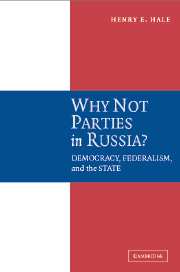Book contents
- Frontmatter
- Contents
- Acknowledgments
- 1 Electoral Markets and Russia's Political Smorgasbord
- 2 Party Entrepreneurship in Russia's Electoral Market 1989–2005
- 3 How Much Party Is in the Party System?
- 4 Electoral Markets and Party Substitutes in Russia : Origins and Impact
- 5 Parties and Party Substitutes : Determining the Balance
- 6 Conclusion : The Market Model and Theories of Parties, National Integration, and Transitions from Authoritarian Rule
- References
- Index
4 - Electoral Markets and Party Substitutes in Russia : Origins and Impact
Published online by Cambridge University Press: 06 July 2010
- Frontmatter
- Contents
- Acknowledgments
- 1 Electoral Markets and Russia's Political Smorgasbord
- 2 Party Entrepreneurship in Russia's Electoral Market 1989–2005
- 3 How Much Party Is in the Party System?
- 4 Electoral Markets and Party Substitutes in Russia : Origins and Impact
- 5 Parties and Party Substitutes : Determining the Balance
- 6 Conclusion : The Market Model and Theories of Parties, National Integration, and Transitions from Authoritarian Rule
- References
- Index
Summary
How can we explain the puzzling pattern that Chapter 3 found to exist? On one hand, that chapter's exhaustive study of party strength established that parties were in many ways quite strong in Russia as President Vladimir Putin moved into his second term in office. Collectively, they had cultivated distinctive positions on important issues, developed sizable populations of loyalists, and proven capable of significantly enhancing their candidates' chances in parliamentary elections. These findings appear to contradict widespread suppositions that Russian parties were consistently incapable of providing meaningful support for their candidates or were unable to communicate clear policy positions. On the other hand, we also saw that this party development had largely stalled by the late 1990s after progressing markedly in the middle of that decade; while some growth reemerged with the 2003 election, it was unbalanced, with one party (United Russia) accounting for a disproportionate share while some other key parties appeared to be in decline. Moreover, we found that parties had penetrated some organs of power more fully than others. These latter observations seem contrary to the anticipation of many theorists that the incentives provided by electoral competition would inevitably and smoothly lead to the prevalence of party politics in some form.
The logic of electoral markets sketched in Chapter 1 supplies us with some explanatory leverage on this puzzle. If candidates are treated as consumers of goods and services that help them get elected, parties can be seen as suppliers who emerge to meet this candidate demand.
- Type
- Chapter
- Information
- Why Not Parties in Russia?Democracy, Federalism, and the State, pp. 150 - 196Publisher: Cambridge University PressPrint publication year: 2005



